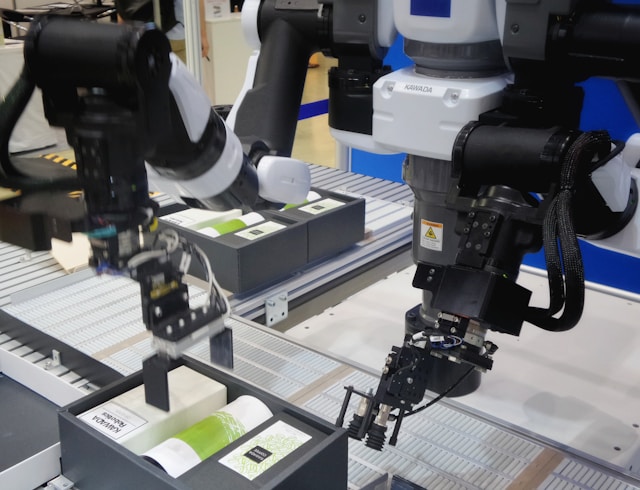Top Malaysian Sectors That Must Embrace Digital Transformation Today
In today's rapidly evolving business landscape, digital transformation is a crucial strategy for businesses and industries worldwide. With its dynamic economy and innovative tech ecosystem, Malaysia stands poised at the forefront of this digital revolution. Embracing digital transformation is not just an option anymore. It is a necessity for staying competitive and relevant in the global marketplace. In this article, we will delve into some of the top Malaysian sectors that must embrace digital transformation today to unlock their full potential and drive sustainable growth.
1. Finance and Banking
The traditional banking model is undergoing a profound shift driven by digital transformation. With fintech innovations disrupting the status quo and consumer preferences veering towards digital experiences. Malaysian banks are at a critical turn point. Embracing digital transformation is all about future-proofing operations to thrive in an increasingly tech-driven world.
By harnessing the power of digital technologies, banks in Malaysia can revolutionize their operations from the ground up. From digitizing paperwork-heavy processes to implementing seamless digital banking solutions, the opportunities are vast. Moreover, data analytics emerges as a game-changer. It can offer insights to drive personalized services, detect fraudulent activities, and optimize decision-making. The adoption of various technologies further enhances efficiency and security. It paves the way for streamlined cross-border payments and trade finance. Through strategic integration of these digital tools and approaches, Malaysian banks can not only meet evolving customer expectations but also unlock new avenues for growth and innovation.

2. Healthcare
For years, Malaysia's healthcare sector has been facing various complex challenges. Digital transformation emerges as the best solution. As healthcare costs escalate and demographic shifts strain resources, the adoption of digital technologies becomes imperative. From telemedicine consultations that transcend geographical barriers to remote monitoring devices that empower patients to manage chronic conditions from the comfort of their homes, digital solutions promise to redefine the delivery of healthcare services in Malaysia.
Furthermore, the implementation of electronic health records (EHRs) streamlines patient data management, fostering seamless collaboration among healthcare professionals and enhancing the continuity of care. The integration of AI-powered diagnostics introduces unprecedented accuracy and efficiency in disease detection and treatment planning. By embracing this digital revolution, Malaysian healthcare providers can improve access to care and enhance patient outcomes. It can also unlock the potential for proactive disease prevention and population health management through the insights gleaned from big data analytics. In essence, digital transformation can safeguard the health and well-being of Malaysia's population for generations to come.
3. Education and EdTech
The education sector in Malaysia is undergoing a digital transformation. At the same time, the shift towards online learning is increasingly evident, largely accelerated by the pandemic. EdTech startups are leveraging digital technologies to deliver personalized learning experiences, gamified content, and immersive simulations. Educational institutions are adopting learning management systems (LMS) and virtual classrooms to facilitate remote learning and collaboration. Embracing digital transformation in education can further encourage critical thinking, creativity, and lifelong learning skills.

4. E-commerce and Retail
The surge in e-commerce activity in Malaysia underscores a fundamental shift in consumer behavior and market dynamics. As internet usages increase and smartphones become a must-have daily tool, the traditional retail landscape is being reshaped rapidly. To thrive in this digital era, brick-and-mortar retailers must embrace digital transformation wholeheartedly to respond to current circumstances.
Embracing digital transformation in e-commerce and retail can help to establish a strong online presence and enhance the customer journey. Leveraging AI-driven recommendation engines and personalized shopping experiences, retailers can cater to individual preferences and drive sales. Augmented reality (AR) applications offer immersive virtual try-on experiences, bridging the gap between online and offline shopping environments. Additionally, the adoption of digital payment solutions can facilitate seamless and safer transactions. By optimizing logistics processes through real-time tracking and route optimization, retailers can ensure timely delivery and minimize operational costs.
5. Manufacturing
Industry 4.0 is the future of production. With its strategic location and established infrastructure, Malaysia stands as a beacon for Industry 4.0 technologies such as automation, robotics, and the Internet of Things (IoT). By embracing these digital innovations, Malaysian manufacturers can unlock unprecedented levels of efficiency and competitiveness. Digitizing operations and implementing smart manufacturing processes can help to streamline workflows. They also allow companies to respond swiftly to market demands, ensuring agility and resilience in the face of uncertainty.
Moreover, the integration of data analytics and predictive maintenance heralds a new era of proactive decision-making and optimization within Malaysian manufacturing. By harnessing the power of data, companies can gain valuable insights into production processes, identify inefficiencies, and preemptively address maintenance needs. As a result, production downtime is minimized and productivity is greatly maximized. However, the journey towards Industry 4.0 is never an easy task. It requires a concerted effort towards upskilling and reskilling the workforce. Investing in training initiatives ensures that Malaysian workers are equipped with the digital literacy and technical competencies required to thrive in the era of smart manufacturing.

6. Tourism and Hospitality
The tourism industry is a vital contributor to Malaysia's economy, but it has been severely impacted by the COVID-19 pandemic and changing travel trends. To adapt to the new normal and rebuild resilience, tourism and hospitality businesses must embrace digital transformation. This includes investing in online booking platforms, virtual tours, and digital marketing strategies to reach and engage travelers in a post-pandemic world. Furthermore, incorporating technologies like AI-powered chatbots and facial recognition for contactless check-ins can enhance customer experiences while ensuring safety and efficiency.
Conclusion
In conclusion, Malaysian sectors should not delay digital transformation anymore as it is a strategic imperative that must be embraced right now. No matter which sector it is, embracing digital technologies can unlock new opportunities and ensure long-term sustainability. With continuous investment in digital development, Malaysian sectors can position themselves for success in the digital age and contribute to the country's continued growth.